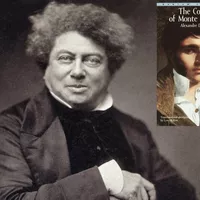Chapter 15. Number 34 and Number 27 (4)
Edmond rose again, but this time his legs did not tremble, and his sight was clear; he went to a corner of his dungeon, detached a stone, and with it knocked against the wall where the sound came. He struck thrice. At the first blow the sound ceased, as if by magic.
Edmond listened intently; an hour passed, two hours passed, and no sound was heard from the wall--all was silent there.
Full of hope, Edmond swallowed a few mouthfuls of bread and water, and, thanks to the vigor of his constitution, found himself well-nigh recovered.
The day passed away in utter silence--night came without recurrence of the noise.
"It is a prisoner," said Edmond joyfully. The night passed in perfect silence. Edmond did not close his eyes.
In the morning the jailer brought him fresh provisions--he had already devoured those of the previous day; he ate these listening anxiously for the sound, walking round and round his cell, shaking the iron bars of the loophole, restoring vigor and agility to his limbs by exercise, and so preparing himself for his future destiny. At intervals he listened to learn if the noise had not begun again, and grew impatient at the prudence of the prisoner, who did not guess he had been disturbed by a captive as anxious for liberty as himself.
Three days passed--seventy-two long tedious hours which he counted off by minutes!
At length one evening, as the jailer was visiting him for the last time that night, Dantes, with his ear for the hundredth time at the wall, fancied he heard an almost imperceptible movement among the stones. He moved away, walked up and down his cell to collect his thoughts, and then went back and listened.
The matter was no longer doubtful. Something was at work on the other side of the wall; the prisoner had discovered the danger, and had substituted a lever for a chisel.
Encouraged by this discovery, Edmond determined to assist the indefatigable laborer. He began by moving his bed, and looked around for anything with which he could pierce the wall, penetrate the moist cement, and displace a stone.
He saw nothing, he had no knife or sharp instrument, the window grating was of iron, but he had too often assured himself of its solidity. All his furniture consisted of a bed, a chair, a table, a pail, and a jug. The bed had iron clamps, but they were screwed to the wood, and it would have required a screw-driver to take them off. The table and chair had nothing, the pail had once possessed a handle, but that had been removed.
Dantes had but one resource, which was to break the jug, and with one of the sharp fragments attack the wall. He let the jug fall on the floor, and it broke in pieces.
Dantes concealed two or three of the sharpest fragments in his bed, leaving the rest on the floor. The breaking of his jug was too natural an accident to excite suspicion. Edmond had all the night to work in, but in the darkness he could not do much, and he soon felt that he was working against something very hard; he pushed back his bed, and waited for day.
All night he heard the subterranean workman, who continued to mine his way. Day came, the jailer entered. Dantes told him that the jug had fallen from his hands while he was drinking, and the jailer went grumblingly to fetch another, without giving himself the trouble to remove the fragments of the broken one. He returned speedily, advised the prisoner to be more careful, and departed.
Dantes heard joyfully the key grate in the lock; he listened until the sound of steps died away, and then, hastily displacing his bed, saw by the faint light that penetrated into his cell, that he had labored uselessly the previous evening in attacking the stone instead of removing the plaster that surrounded it.
The damp had rendered it friable, and Dantes was able to break it off--in small morsels, it is true, but at the end of half an hour he had scraped off a handful; a mathematician might have calculated that in two years, supposing that the rock was not encountered, a passage twenty feet long and two feet broad, might be formed.
The prisoner reproached himself with not having thus employed the hours he had passed in vain hopes, prayer, and despondency. During the six years that he had been imprisoned, what might he not have accomplished?
In three days he had succeeded, with the utmost precaution, in removing the cement, and exposing the stone-work. The wall was built of rough stones, among which, to give strength to the structure, blocks of hewn stone were at intervals imbedded. It was one of these he had uncovered, and which he must remove from its socket.
Dantes strove to do this with his nails, but they were too weak. The fragments of the jug broke, and after an hour of useless toil, he paused.

